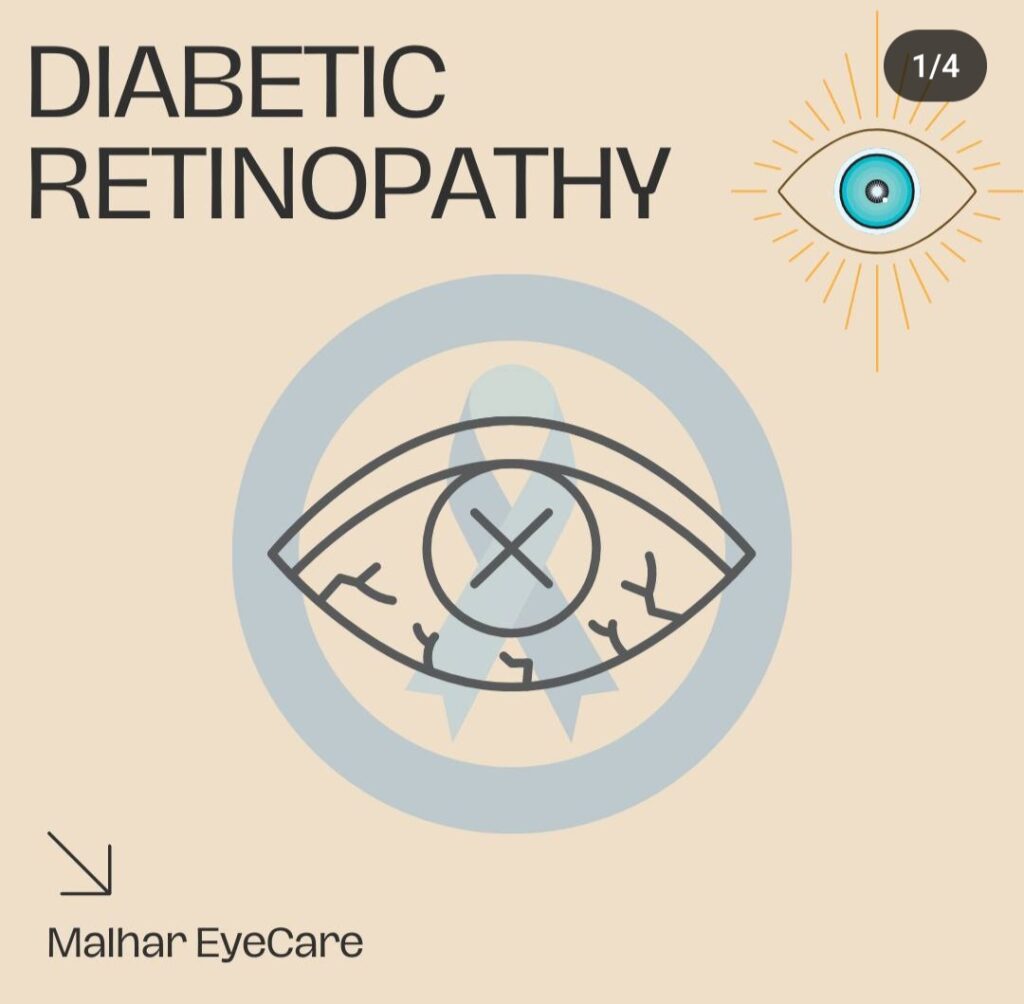Diabetic Retinopathy Treatment: A Comprehensive Guide

Diabetic retinopathy is a serious eye condition that can affect anyone with type 1 or type 2 diabetes. It occurs when high blood sugar levels cause damage to the blood vessels in the retina, the light-sensitive tissue at the back of the eye. Initially, diabetic retinopathy may not show any symptoms or only cause minor vision problems. However, if left untreated, it can lead to severe vision impairment or even blindness. At Malhar Eye Care, Dr. Supriya Pendke specializes in diabetic retinopathy treatment, offering advanced solutions to protect and restore your vision.
What Is Diabetic Retinopathy?
Diabetic retinopathy is one of the most common complications of diabetes and is caused by prolonged high blood sugar levels. Over time, elevated blood sugar damages the tiny blood vessels in the retina, which can cause them to leak fluid or bleed. In more advanced stages, abnormal new blood vessels may grow on the retina, further compromising vision.
This condition can affect anyone with diabetes, whether you have type 1 or type 2. The longer you live with diabetes and the less controlled your blood sugar levels are, the higher the risk of developing diabetic retinopathy. It’s essential for individuals with diabetes to undergo regular eye exams to detect and treat the condition in its early stages.
Symptoms of Diabetic Retinopathy
The symptoms of diabetic retinopathy vary depending on how advanced the condition is. In its early stages, it might not cause any noticeable symptoms, making regular eye checkups crucial for early detection. As the condition progresses, you may experience one or more of the following:
- Floaters: Floating spots or black strings in your vision.
- Blurred Vision: Vision impairment or difficulty seeing clearly.
- Variable Vision: Your vision may fluctuate from clear to blurry.
- Dark Spots: You may notice dark or empty spots in your field of vision.
- Vision Loss: In severe cases, untreated diabetic retinopathy can lead to complete loss of vision.
If you experience any of these symptoms, it’s essential to consult an eye care professional, such as Dr. Supriya Pendke at Malhar Eye Care, for a thorough examination and early intervention.
Stages of Diabetic Retinopathy
Diabetic retinopathy progresses through several stages, each with increasing risk to your vision:
- Mild Non-Proliferative Retinopathy: In this early stage, small areas of swelling, known as microaneurysms, occur in the retina’s blood vessels. These microaneurysms may leak fluid into the retina, but the damage is usually minimal, and there may not be noticeable symptoms.
- Moderate Non-Proliferative Retinopathy: As the condition progresses, the blood vessels that nourish the retina become blocked, restricting blood flow. At this stage, more noticeable changes in vision may begin to occur, such as blurriness or difficulty seeing at night.
- Severe Non-Proliferative Retinopathy: In this more advanced stage, many blood vessels in the retina are blocked, cutting off the retina’s blood supply. As a result, the retina signals the body to grow new blood vessels, which is a problematic development in diabetic retinopathy.
- Proliferative Diabetic Retinopathy: This is the most advanced stage of the condition. At this point, new, abnormal blood vessels grow in the retina, which can leak blood into the eye and cause serious vision problems, including retinal detachment. Without prompt diabetic retinopathy treatment, this stage can lead to permanent blindness.
Risk Factors for Diabetic Retinopathy
Several factors can increase the likelihood of developing diabetic retinopathy:
- Duration of Diabetes: The longer you have diabetes, the higher the risk.
- Uncontrolled Blood Sugar: Poorly managed blood sugar levels significantly increase the risk of diabetic retinopathy.
- High Blood Pressure: Hypertension can worsen diabetic retinopathy and accelerate vision loss.
- High Cholesterol: Elevated cholesterol levels can contribute to the damage of blood vessels in the eye.
- Pregnancy: Pregnancy can sometimes worsen diabetic retinopathy in women with pre-existing diabetes.
- Smoking: Smoking can exacerbate the damage to the blood vessels in the eyes.
At Malhar Eye Care, Dr. Supriya Pendke emphasizes the importance of managing diabetes through lifestyle adjustments, proper medication, and regular eye exams to minimize the risk of developing or worsening diabetic retinopathy.
Diabetic Retinopathy Treatment Options
The good news is that diabetic retinopathy treatment has advanced significantly in recent years, and in most cases, treatment is effective in preventing serious vision loss. The best treatment for you will depend on the severity of your condition, but the most common options include:
- Laser Therapy (Photocoagulation): Laser therapy is often used to treat diabetic retinopathy by sealing off leaking blood vessels and reducing the risk of further bleeding. This treatment is most effective in the early stages of diabetic retinopathy, particularly when abnormal blood vessels have not yet formed. Laser therapy can slow the progression of the condition and help preserve vision.
- Anti-VEGF Injections: Anti-VEGF (vascular endothelial growth factor) injections are used to block the formation of abnormal blood vessels in the retina. This treatment helps reduce fluid leakage, swelling, and the growth of new, abnormal blood vessels. Anti-VEGF drugs can be a highly effective diabetic retinopathy treatment in more advanced stages, especially in cases of proliferative retinopathy.
- Surgery (Vitrectomy): In severe cases of diabetic retinopathy, surgery may be required. A vitrectomy is a procedure in which the vitreous gel (the clear gel-like substance inside the eye) is removed and replaced. This is often necessary when there is significant bleeding or retinal detachment due to the abnormal blood vessels caused by proliferative diabetic retinopathy. Dr. Supriya Pendke is experienced in performing this delicate surgery, ensuring the best possible outcomes for patients at Malhar Eye Care.
Managing Diabetic Retinopathy: Prevention and Control
While diabetic retinopathy can cause serious vision problems, the condition can often be prevented or controlled through effective diabetes management. Here are some steps you can take to lower your risk:
- Regular Eye Exams: Early detection is crucial in preventing vision loss. Schedule regular eye exams with Dr. Supriya Pendke at Malhar Eye Care to monitor your eye health.
- Blood Sugar Control: Maintaining stable blood sugar levels is key to reducing the risk of diabetic retinopathy. Follow your doctor’s advice on diet, exercise, and medications to keep your blood sugar under control.
- Manage Blood Pressure and Cholesterol: High blood pressure and high cholesterol can damage blood vessels, including those in your eyes. Keep these conditions in check through lifestyle changes and medications.
- Quit Smoking: Smoking increases the risk of diabetic complications, including retinopathy. Quitting smoking can help protect your vision and overall health.
Why Choose Malhar Eye Care for Diabetic Retinopathy Treatment?
At Malhar Eye Care, we understand the impact that diabetic retinopathy can have on your vision and quality of life. Dr. Supriya Pendke is a highly skilled ophthalmologist with extensive experience in diagnosing and treating diabetic retinopathy. We offer the latest treatment options, from laser therapy to surgery, ensuring that each patient receives personalized care tailored to their needs.
Our team is dedicated to helping you manage your eye health and maintain your vision, even in the face of diabetes. Through a combination of advanced technology, expert care, and a patient-centered approach, we provide the best possible outcomes for those dealing with diabetic retinopathy.
Conclusion
Diabetic retinopathy is a serious eye condition that can lead to vision loss if not properly managed. However, with early detection and appropriate treatment, the risks can be minimized, and vision can often be preserved. At Malhar Eye Care, Dr. Supriya Pendke offers advanced diabetic retinopathy treatment to protect your eyesight and enhance your quality of life. If you have diabetes, regular eye checkups and proactive care are essential to maintaining good vision and preventing complications.
Don’t wait until symptoms worsen—schedule an appointment at Malhar Eye Care today and take control of your eye health.
